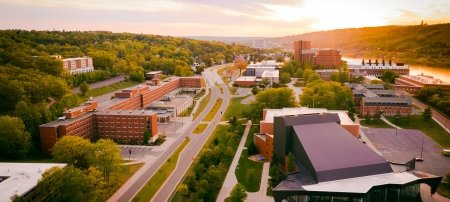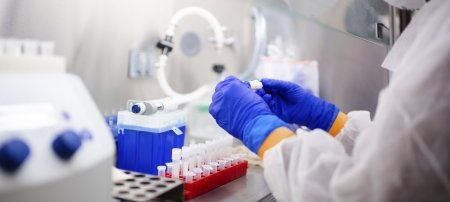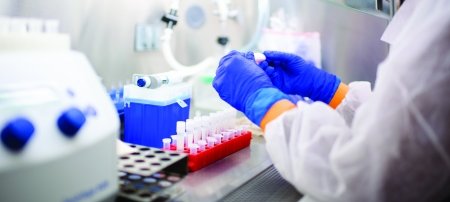Starting this week, Michigan Technological University will begin testing patient samples for COVID-19, working alongside regional health care providers.
With delays in testing across the nation, rural and remote regions like Michigan’s Upper Peninsula have been hard pressed to get enough tests for patients. But there is hope.
Michigan Tech has partnered with local hospitals to begin receiving and testing patient samples on campus to save doctors and health care providers at least 24 hours, and up to a week, of waiting for COVID-19 test results. The lab has the capacity to run 40 samples per hour on two machines, and the team has plans to expand with more equipment and staffing.
Leading the Lab
Dr. Cary Gottlieb, pathologist from OSF St. Francis Hospital in Escanaba, is the lab
director. The technical leads are Caryn Heldt and David Dixon, and the team includes
Steve Techtmann, Ebenezer Tumban, Kristin Brzeski and Carsten Kulheim, with support
from Karyn Fay, Claire Danielson, Brigitte Morin, Sean Kirkpatrick, Guiliang Tang,
Jennifer Sanders and Julie Seppala.
For more information, email covidtesting@mtu.edu
“The safety of our community and our lab technicians is most important,” said Dave Reed, vice president for research at Michigan Tech. “We live in small, tight-knit communities in the UP and we want to take care of each other and Michigan Tech can help by ensuring people get timely and accurate COVID-19 test results.”
Copper Country Strong
Rep. Greg Markkanen and Sen. Ed McBroom helped initiate the lab testing facility and advocated for test sites in the UP.
“The people of the Copper Country and Western UP want to be able to take care of their own,” said Markkanen, adding that Michigan Tech’s testing facility eases the strain on small communities’ health resources. “The Herculean effort of the folks at Michigan Tech will meet our communities’ needs to get tests and results quicker, so that health care workers can do their jobs and help monitor this crisis.”
Time is of the essence — and so is accuracy. The Michigan state labs have helped verify the accuracy and protocols in the Michigan Tech facility.
"Quick testing for an illness like the coronavirus is critical to helping treat patients who have caught the disease and to help stop the spread," said McBroom. "With results often taking more than a week as tests traveled downstate, it was apparent that this would be a problem for the Upper Peninsula. I'm proud of the professionals at Michigan Tech who recognized this issue, developed a plan for a lab on campus and turned it into a reality."
Michigan Tech is also working on vaccine technology and technology to clean personal protection equipment (PPE).
Coronavirus Testing
Coronavirus disease 2019 (COVID-19) is caused by the SARS-CoV-2 virus, also called the novel coronavirus. Related to SARS and MERS, as explained by one of our Michigan Tech virologists, the virus belongs to the coronavirus family, named for a spiky crown of proteins around the outside shell.
The test to confirm a COVID-19 case has two parts and relies on finding the genetic fingerprint of COVID-19 among the skin cells, mucus and microbes collected by a nasal swab test.

First, the genetic code needs to be pulled out of the samples; this is called RNA extraction. Then, using a thermocycler machine, the extracted sample is run through a polymerase chain reaction (PCR). The PCR machine amplifies genetic code and makes it easier to find the coronavirus RNA fingerprint. Using specific chemicals, or reagents, the PCR machine produces a positive or negative result, depending on whether the virus’s RNA is present and how much is present.
Tests for new diseases need both specificity (identifying the correct fingerprint) and sensitivity (finding the fingerprint in a messy crime scene). The challenge with COVID-19 tests — one the whole world is facing — deals with sensitivity: Low levels of coronavirus are harder to detect. This is more common with early infections. If someone has a full-blown infection, it’s easy to determine a positive test result within hours.
The validation tests run in the Michigan Tech lab last week are promising, and they meet state and federal guidelines to support an Emergency Use Authorization. The lab also ensures patient privacy and has strict protocols in place to keep the lab staff safe and produce accurate test results.
“There is a lot that goes into setting up a lab with the biosafety and privacy requirements to run clinical tests like this one for COVID-19,” said Claire Danielson, medical laboratory science clinical practicum coordinator at Michigan Tech and one of the researchers who set up the lab. “We couldn’t simply bring in any PCR machine and make it work. The whole team came together to determine what machines would work, how to deal with reagent and material shortages, and to work with the state to make sure the lab meets all health department and FDA requirements.”
The other researchers running the lab include a medical doctor, a virologist and a chemical engineer specializing in vaccine development, as well as plant and wildlife geneticists, microbiologists and biomedical engineers who usually stick to the technology side of medicine.
“In times like this, everyone learns how to retool their expertise and bring an important set of skills to the table,” Reed said. “I’m proud of our Michigan Tech team. We’ve got a lot of work ahead of us and a lot of motivation to keep our communities and health care workers informed and safe while we live through the COVID-19 outbreak.”
Michigan Technological University is an R1 public research university founded in 1885 in Houghton, and is home to nearly 7,500 students from more than 60 countries around the world. Consistently ranked among the best universities in the country for return on investment, Michigan's flagship technological university offers more than 120 undergraduate and graduate degree programs in science and technology, engineering, computing, forestry, business, health professions, humanities, mathematics, social sciences, and the arts. The rural campus is situated just miles from Lake Superior in Michigan's Upper Peninsula, offering year-round opportunities for outdoor adventure.






Comments